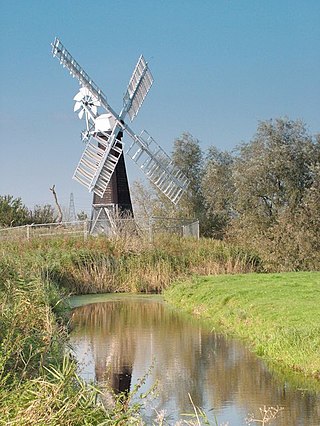An equitable servitude is a term used in the law of real property to describe a nonpossessory interest in land that operates much like a covenant running with the land. In England and Wales the term is defunct and in Scotland it has very long been a sub-type of the Scottish legal version of servitudes, which are what English law calls easements. However covenants and equitable servitudes in most of the jurisdictions across North America, are slightly different. The usual distinction is based on the remedy plaintiff seeks and precedent will allow for the scenario in question. Where the terms are unmerged, holders of a covenant seek money damages; holders of equitable servitudes seek injunctions. The term used to exist in England widely before Tulk v Moxhay and as byproduct of the Judicature Acts became one of the fullest mergers of equity and common law in England and Wales so as to agree initially on the term "equitable covenant", then coming to be united in the term covenant save that "equitable" bears a particular meaning in English property rights since at least 1925: it means not fully compliant with registration/written formalities. If lacks legally routine formalities it is not a full legal covenant and therefore more tenuous, often only enforceable personally and against the original covenantor.
A covenant, in its most general sense and historical sense, is a solemn promise to engage in or refrain from a specified action. Under historical English common law, a covenant was distinguished from an ordinary contract by the presence of a seal. Because the presence of a seal indicated an unusual solemnity in the promises made in a covenant, the common law would enforce a covenant even in the absence of consideration. In United States contract law, an implied covenant of good faith is presumed.

In contract law, the implied covenant of good faith and fair dealing is a general presumption that the parties to a contract will deal with each other honestly, fairly, and in good faith, so as to not destroy the right of the other party or parties to receive the benefits of the contract. It is implied in a number of contract types in order to reinforce the express covenants or promises of the contract.

English contract law is the body of law that regulates legally binding agreements in England and Wales. With its roots in the lex mercatoria and the activism of the judiciary during the industrial revolution, it shares a heritage with countries across the Commonwealth, from membership in the European Union, continuing membership in Unidroit, and to a lesser extent the United States. Any agreement that is enforceable in court is a contract. A contract is a voluntary obligation, contrasting to the duty to not violate others rights in tort or unjust enrichment. English law places a high value on ensuring people have truly consented to the deals that bind them in court, so long as they comply with statutory and human rights.
In common law jurisdictions such as England and Wales, Australia, Canada, and Ireland, a freehold is the common mode of ownership of real property, or land, and all immovable structures attached to such land. It is in contrast to a leasehold, in which the property reverts to the owner of the land after the lease period expires or otherwise lawfully terminates. For an estate to be a freehold, it must possess two qualities: immobility and ownership of it must be forever. If the time of ownership can be fixed and determined, it cannot be a freehold. It is "An estate in land held in fee simple, fee tail or for term of life."

Re Ellenborough Park[1955] EWCA Civ 4 was an English land law case which reformulated the tests for an easement. It found an easement to use a communal garden to be a valid easement in law. There is no requirement for all of the houses to be immediately next to the garden to benefit from it.
The English law of unjust enrichment is part of the English law of obligations, along with the law of contract, tort, and trusts. The law of unjust enrichment deals with circumstances in which one person is required to make restitution of a benefit acquired at the expense of another in circumstances which are unjust.

Smith and Snipes Hall Farm Ltd v River Douglas Catchment Board [1949] 2 KB 500 is an English land law and English contract law appeal decision. The case, decided by Denning LJ, confirmed positive covenants can supplant privity of contract in contracts to improve land and secondly a covenant should be implied where the contract shows an intention that the obligation would attach to the land. The case thirdly held in that context, a somewhat uncertain description of lands which was capable of being rendered certain by extrinsic evidence was sufficient to enforce the covenant.

Unregistered land in English law is land that has not been registered with HM Land Registry. Under the residual principles of English land law, for unregistered land proof of title is based upon historical title deeds and a registry for certain charges under the Land Charges Act 1972.
Easements in English law are certain rights in English land law that a person has over another's land. Rights recognised as easements range from very widespread forms of rights of way, most rights to use service conduits such as telecommunications cables, power supply lines, supply pipes and drains, rights to use communal gardens and rights of light to more strained and novel forms. All types are subject to general rules and constraints. As one of the formalities in English law express, express legal easements must be created by deed.
A private transfer fee covenant is a legal instrument that is filed in the real property records, which imposes an assessment payable in connection with a series of future transfers of title to certain real property. The assessment can be for a fixed amount or a percentage of the sales price, and typically runs for a limited term. Unlike a transfer tax a private transfer fee assessment is payable to an identified third-party, often a community association, the real estate developer, and/or an environmental or charitable organization. According to the Coalition to Save Community Benefits, private transfer fee covenants of some kind encumber approximately eleven million homes in the United States. Although encumbering a statistically small percentage of the estimated 135 million homes nationwide, increased use of private transfer fee assessments, particularly by real estate developers beginning around 2007, when financing became difficult to obtain on commercially reasonable terms, lead to increased regulation at both the federal and state level.

Tulk v Moxhay is a landmark English land law case that decided that in certain cases a restrictive covenant can "run with the land" in equity. It is the reason Leicester Square exists today.

English land law is the law of real property in England and Wales. Because of its heavy historical and social significance, land is usually seen as the most important part of English property law. Ownership of land has its roots in the feudal system established by William the Conqueror after 1066, and with a gradually diminishing aristocratic presence, now sees a large number of owners playing in an active market for real estate.

National Provincial Bank Ltd v Ainsworth [1965] is an English land law and family law case, concerning the quality of a person's interest in a home when people live together, as well as licenses in land.

Phipps v Pears [1964] is an English land law case, concerning easements. The case concerns walls other than those governed by the Party Wall Act. Party walls are those which are touch or are shared or agreed to be party walls. The court held the law will not imply or invent a new form of negative easement to prevent a neighbour's wall being pulled down which offers some protection.

Green v Lord Somerleyton is an English land law and tort law case, concerning easements of surface water/ditch drainage and the tests for nuisance in English law. In this case there was no remedy for the flooding found to be natural and not recently exacerbated by the defendant. The court attached to the properties an old, 1921, easement of drainage passing both land holdings, in this case two common examples of lowland water engineering, dykes controlled against tides by one-way valves, mentioned in the properties' deeds and, duplicatively, established the right by prescription. The dykes lay in the claimant's own land who had failed to maintain them and failed to account for the flows caused by reduction of water extraction from the lake upstream. The claimant had failed to repair the pump and clear ditches on his own land which had been agreed between the previous owners to give channelled drainage from a lake above. It was for the claimant to recognise the danger posed by its waterline being raised in 1954 by the building up of a weir.

Crow v Wood[1970] EWCA Civ 5 is an English land law case, confirming an easement commonly exists for the right to have a fence or wall kept in repair expressed in earlier deeds, which is a right which is capable of being "granted" by law and secondly, as a separate but on the facts, related issue, of the right of common land pasture asserted by continued use.

Morrells of Oxford Ltd v Oxford United Football Club [2001] Ch 459 is an English land law case concerning covenants and their interpretation in a conveyance, particularly discerning and distinguishing those expressly or impliedly with no intention to bind successors — those of a personal nature, enforceable "inter partes", that is between the parties to the original deed. It concerned a restraint of trade covenant and was unlike the others surrounding it not expressed to bind all heirs and assigns.

Rhone v Stephens[1994] UKHL 3 is an English land law case, at the court of final appeal level, concerning the succession to the burden of positive covenants in freehold land within which it is of relatively broad application. It is distinguished in cases of regular payments related to easements in English law which are enjoyed and some other narrow categories, many of which are similarly well-known and well-cited notable cases.
Rates are a tax on property in the United Kingdom used to fund local government. Business rates are collected throughout the United Kingdom. Domestic rates are collected in Northern Ireland and were collected in England and Wales before 1990 and in Scotland before 1989.













